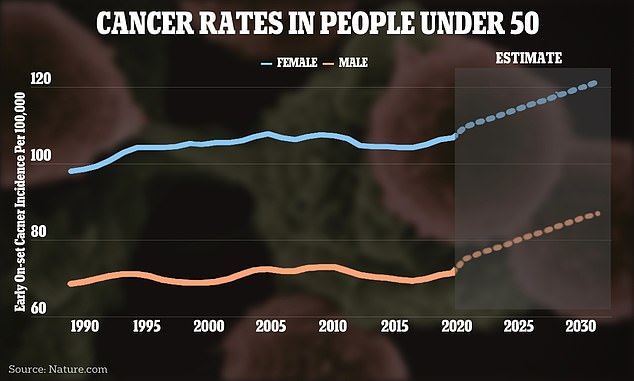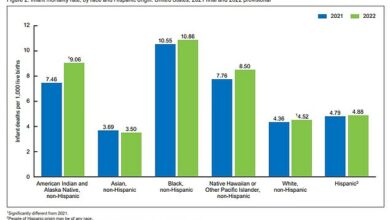Cancer expert reveals every new patient he sees is under 45 – and he shares what they all have in common



A North Carolina doctor is speaking out about the rise in cancer cases among young people, saying that “every new patient” who comes to his clinic is under the age of 45.
Dr. Nicholas DeVito, an oncologist at Duke University, says he and his colleagues have seen a complete demographic change in recent years, which he The blame lies with ultra-processed foods (UPFs).
Nearly 75 percent of the food consumed in the US is considered ultra-processed and is loaded with additives and harmful ingredients
And these products are virtually unregulated, despite the fact that numerous studies show a link between a diet high in UPF and more than 30 conditions, including cancer.

The graph above shows the change in rates of early-stage cancer worldwide, broken down by female (pink) and male (blue).
Dr. DeVito has called on officials across industries and political parties to do more to protect Americans from these harmful products.
The Doctor wrote for STAT News: ‘The desire to protect Americans from substances that cause cancer and other diseases should transcend partisan preferences and political motives and overcome industry lobbying efforts.
‘That was possible with tobacco, and it is also possible with food.’
He added: “Certainly Americans need to make different choices about what they eat so that they put their health ahead of corporate profits and sometimes even their own convenience.”
Early research has shown that UPFs (foods that have undergone multiple rounds of processing and have artificial ingredients added) can alter the gut microbiome (a collection of healthy bacteria), damage the gut lining, and cause chronic inflammatory diseases, all of which can increase the risk of cancer.
Between 1990 and 2019, cancer cases among young people worldwide increased by 79 percent and deaths increased by 28 percent.
The US has the sixth highest rate of premature cancers (disease in people under 50), with 87 cases per 100,000 people under 50.
Research shows that the number of cancer diagnoses occurring at a young age will increase by 31 percent and the number of deaths will increase by 21 percent by 2030.
Cancers that are increasing the fastest are throat and prostate cancer. Cancers that present early and have the highest mortality are breast, trachea, lung, stomach and colon cancer.
But 40 percent of cancers in the U.S. are caused by risk factors that can be changed, according to a report from the American Cancer Society study – and cancer could be prevented if lifestyle were improved.
These factors include alcohol consumption, smoking, inactivity and the consumption of UPFs.
While it has long been known that an unhealthy diet high in fats and sugars is harmful to health, experts are calling for more attention to ingredient lists, not just nutritional values.
Analysis of this data shows that many of the ‘healthy’ foods that people eat are full of artificial ingredients, and are therefore classified as ultra-processed foods.
To avoid this, the rule of thumb is to stick to products with fewer than five ingredients and avoid products whose ingredients are difficult to pronounce.
A 2023 study In the journal Clinical Nutrition, a ‘consistently significant association was found between UPF intake and the risk of overall and several cancers,’ including colon, breast and pancreatic cancer.
A different Meta-analyses also found that a diet high in UPFs was linked to more than 30 health problems, including colon, rectal and pancreatic cancer; obesity, which increases the risk of cancer; and heart disease and diabetes.
Dr. DeVito, who treats patients with gastrointestinal cancers such as colon and stomach cancers – two forms with the highest mortality rates – said food can play “an important role” in prevention – a concerning fact datum Nearly 75 percent of the food consumed in the US is considered ultra-processed.
The oncologist wrote: ‘Nutrition can play an important role in this. Knowledge of ingredients, the American food system and how food affects the body is crucial to reducing the risk of cancer.’
He compared UPFs to tobacco, which became widespread about a century ago and wasn’t regulated until 2009. After the boom, lung cancer rates rose until about the 1990s.

Above you can see the most common type of cancer in each country
While the FDA now has the authority to regulate tobacco, in the US it does not have that authority for ultra-processed foods. Unlike Europe, where stricter guidelines and more rigorous testing are in place.
This lack of regulation has led to an increase in the number of UPFs on the market and an increase in their consumption.
However, Dr. DeVito believes that, as with tobacco, “collective efforts by healthcare providers, public health experts, governments and other organizations” could have a major impact on the UPF market and reduce cancer deaths.
He wrote: “Local and national governments have a responsibility to eliminate food deserts by providing affordable, healthier choices than fast and highly processed foods in every zip code.”
He called on the federal government to urge the FDA to more strictly control the processing and additives in foods while increasing the variety and availability of healthier choices.
He advised doctors to discuss UPF consumption with their patients and advise them to avoid the products. He also suggested that supermarkets label UPF products and separate them from healthy foods.
Dr. DeVito wrote, “I hope to have a long career in oncology and ultimately practice in an era when the United States has turned the tide against early-onset gastrointestinal cancers and few, if any, of my patients are younger than 50 years of age.”




